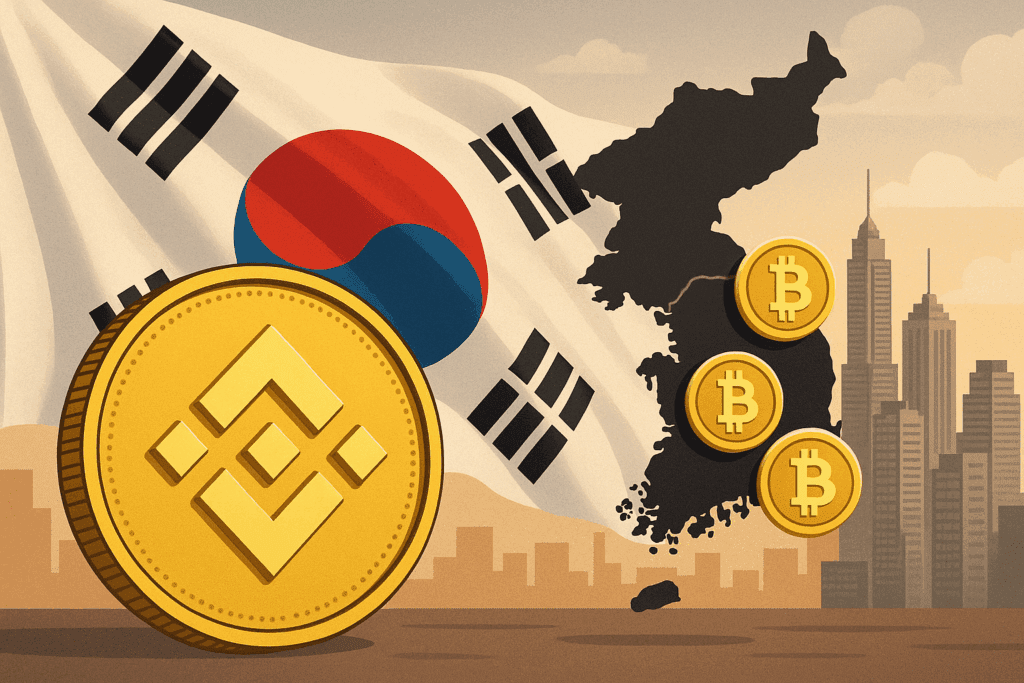South Korea is moving closer to permitting Binance’s return to its cryptocurrency market after nearly two years of uncertainty. The latest review of Binance’s majority stake in local exchange Gopax suggests that the world’s largest cryptocurrency platform may soon regain access to one of Asia’s most tightly regulated markets.
Regulatory Review and Implications for Binance
The Financial Intelligence Unit (FIU) has resumed its examination of Binance’s majority stake in the domestic exchange Gopax, indicating that the regulatory body may soon grant approval for Binance to re-establish its presence in South Korea. The process currently centers on a leadership change request rather than a direct ownership evaluation, which could allow Binance to regain full access to South Korean traders by the end of 2025. This would be a pivotal development in Binance’s strategy for the Asian market.
Under South Korean law, regulators assess key leadership changes rather than shareholder proposals from cryptocurrency firms. This implies that the FIU’s scrutiny of Gopax’s management structure serves as a significant test for Binance’s fitness to maintain its majority ownership. Binance acquired a 67% stake in Gopax in February 2023, becoming its largest shareholder. However, the approval process has been stalled due to concerns related to anti-money laundering compliance and legal challenges faced by the exchange in the United States.
These concerns were alleviated after Binance agreed to pay a $4.3 billion settlement with U.S. authorities in 2023, which has since helped restore regulatory confidence in multiple jurisdictions, including South Korea. The renewed examination indicates that regulators are now inclined to assess Binance’s governance record rather than its legal history. If approved by the FIU, Binance would formalize its control and be permitted to resume activities under Gopax’s license.
Gopax’s Liquidity Crisis and Binance’s Rescue Efforts
Gopax is one of the few South Korean exchanges licensed to facilitate cryptocurrency transactions denominated in won, requiring strict compliance with know-your-customer and anti-money laundering regulations. The exchange faced severe financial difficulties in early 2023 when its decentralized finance partner, Genesis Global Capital, suspended withdrawals related to Gopax’s GoFi yield product.
Approximately $47 million of clients’ assets were locked, eroding user trust and liquidity. Binance’s investment was initially positioned as a stabilization plan aimed at replenishing user funds and restoring market confidence. However, the prolonged delay in approval has forced Binance to contemplate selling part of its stake to local tech firm Megazone to meet domestic ownership expectations. Ultimately, talks collapsed in late 2024, preserving Binance’s majority ownership.
As the FIU continues to review Gopax’s leadership changes, Binance’s role as both an investor and potential operator is back in focus. Market analysts believe the outcome will determine whether global cryptocurrency platforms can meet the compliance standards of a country known for its stringent digital asset regulations.
Shifts in Cryptocurrency Regulation in South Korea
The FIU’s latest actions coincide with a broader overhaul of regulations in South Korea. Authorities have recently ordered all cryptocurrency platforms to suspend personal lending products until a clear legal framework is established. The government is also drafting regulations for stablecoins tied to the Korean won and preparing to allow the country’s first cryptocurrency cash funds.
Meanwhile, local market leader Dunamu, operator of Upbit, has launched an institutional custody service that holds clients’ assets exclusively in cold wallets to reduce exposure to cyberattacks. These changes highlight how South Korea is moving towards institutional-level oversight while promoting investor protection through stricter governance.
By resuming its examination of Gopax, the FIU signals that foreign exchanges like Binance could participate in this evolving landscape, provided they align with national compliance standards.
Potential Breakthrough for Global Exchanges in Asia
A favorable conclusion to the review could reshape Binance’s position in East Asia, as South Korea remains one of the region’s most active cryptocurrency markets in terms of trading volume. Binance’s return would strengthen its regional network following recent regulatory challenges faced in Japan and the Philippines. For the South Korean market, an approval for Binance would also mark a symbolic shift from cautious exclusion to selective engagement with global players that demonstrate regulatory cooperation.
A decision is anticipated later in 2025, which could serve as a benchmark for how international cryptocurrency companies are evaluated in other jurisdictions with similar review requirements. If approved, Binance’s full return via Gopax would underscore a broader transformation: a move towards transparency, tighter controls, and restored confidence in an industry that continues to evolve under governmental oversight.

Meet William, a proud Bethel University alumnus with a fervent passion for lifestyle and culture topics. His keen interest doesn’t stop there; he’s also deeply engrossed in current events of all kinds. William dedicates himself wholeheartedly to this site, thriving on the collaborative energy he shares with Suzanne, his long-standing partner in crime.
Having navigated their university courses side by side for years, their teamwork on the site is nothing short of dynamic. Together, they bring a unique blend of insights, proving that two heads are indeed better than one in delivering compelling content.













